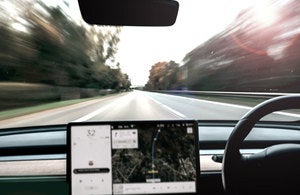
Changes to the UK Highway Code will help ensure the first wave of self-driving vehicles are used safely on local roads, the Department of Transport said.
Changes clarify drivers’ responsibilities in self-driving vehicles, including when a driver must be ready to take back control.

Discover B2B Marketing That Performs
Combine business intelligence and editorial excellence to reach engaged professionals across 36 leading media platforms.
While travelling in self-driving mode, motorists must be ready to resume control in a timely way if they are prompted to – such as when they approach motorway exits.
The plans also include a change to current regulation, allowing drivers to “view content that is not related to driving” on built-in display screens, while the self-driving vehicle is in control.
Or, as at least one tabloid newspaper headline said today: it would be legal to watch TV while in the driver’s seat.
It will, however, still be illegal to use mobile phones in self-driving mode, given the greater risk they pose in distracting drivers as shown in research.
The DfT said Britain’s first vehicles approved for self-driving could be ready for use later this year after rigorous testing and approved as self-driving only when they have met stringent standards.
The government is continuing to develop a full legal framework for self-driving vehicles. The department will also work with industry, regulators and safety organisations to ensure drivers can access information, including online, to help them use the vehicles safely.
The government claims development of self-driving vehicles “could” create around 38,000 new, high-skilled jobs worth GBP41.7 billion by 2035.
The measures confirmed today follow a public consultation launched by the government, which found the majority of respondents were broadly supportive of the proposed changes to the highway code to clarify drivers’ responsibilities in self-driving vehicles.
The introduction of the technology is likely to begin with vehicles travelling at slow speeds on motorways, such as in congested traffic.
The government announced in April last year that vehicles fitted with automated lane keeping system (ALKS) technology could be the first example of self-driving technology. Existing technology available on the market is ‘assistive’, meaning drivers must currently always remain in control and responsible.
Designed for use on a motorway in slow traffic, ALKS enables a vehicle to drive itself in a single lane, up to 37mph while maintaining the ability to return control easily and safely to the driver when required.
Meanwhile, the government expects to have a full regulatory framework in place to support the widespread deployment of the technology by 2025.
The technology could improve road safety across Britain by reducing human error, which is a contributory factor in 88% of all recorded road collisions.






